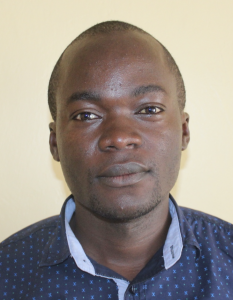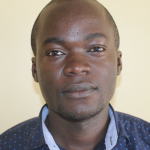ADC Ikonza Primary School has no reliable water source on its school campus, leaving its 248 students and staff struggling every day. Students' health and academic performance suffer, daily cleaning becomes challenging, and food cannot be prepared, leaving everyone hungry.

"As a teacher and parent of this school, water has really been a major problem to us. Academically, my pupils are affected much due to time-wasting looking for water, especially during morning lessons. Preparing meals for teachers and doing cleanliness in school is a bit hard because [the] water is not enough to serve [us] well, hence [our] hygiene is not up to standard. Lastly, health issues are many in this school, which also contributes to [the] high rate of absenteeism among pupils," said teacher Benjamin Kaveyi (shown below).

Students spend far too much time missing school because of water, whether they are out of class searching for it, or they are sick after consuming the unsafe water.
"Water has been a challenge for me as a pupil of this school. Time-wasting looking for water also contributes to [our] slow syllabus coverage and poor performance in academics. The distance also covered looking for water makes us tired, [with] no concentration in class. Also, the learning environment is not cleaned daily, which makes it difficult to have [a] conducive learning [environment]," said student Janet K., shown below collecting water.

The stream where students collect water is far from the school, leaving everyone exhausted from the trip.
"When water is further away, it requires more time to collect, which often means less time at school. Particularly for girls, a shortage of water in schools impacts student enrolment, attendance and performance." -UNICEF
And after all this effort, the water collected gives students a high chance of contracting illnesses such as typhoid, cholera, sore throat, and diarrhea.
With a new well on their campus, students should be able to regain their health and reserve their time and energy for learning.
What We Can Do:
New Well
We conducted a hydrogeological survey at this school and the results indicated the water table beneath it is an ideal candidate for a borehole well. Due to a borehole well's unique ability to tap into a safe, year-round water column, it will be poised to serve all of the water needs for this school's large population, even through the dry months.
The school will help collect the needed construction materials such as sand, rocks, and water for mixing cement. They will also provide housing and meals for the work team, in addition to providing local laborers. We will complement their materials by providing an expert team of artisans and drilling professionals, tools, hardware, and the hand-pump. Once finished, water from the well will then be used by the school’s students and staff for drinking, handwashing, cooking, cleaning, and much more.
Handwashing Stations
The student health club will oversee the two new handwashing stations we will provide, and make sure they are kept clean and in working condition. The club leaders will fill the handwashing stations with water daily and make sure they are always supplied with a cleaning agent such as soap or ash.
VIP Latrines
We will construct two triple-door latrine blocks using local materials that the school will help gather. Three doors will serve the girls and three doors will serve the boys. All of these new latrines will have cement floors that are designed to be easy to use and to clean. And with a borehole right on school property, there should be enough water to keep them clean.
Training on Health, Hygiene, COVID-19, and More
We will hold a one-day intensive training session with students, teachers, and parents. This training will cover a wide range of topics including COVID-19 symptoms, transmission routes, and prevention; personal and environmental hygiene; and the operation and maintenance of the borehole, latrines, and handwashing stations. There will be a special emphasis on handwashing.
Our team of facilitators will use a variety of methods to train, including participatory hygiene and sanitation transformation, and asset-based community development. We will initiate a student health club, which will prepare students to lead other pupils into healthy habits at school and at home. We will also lead lectures, group discussions, and provide illustrative handouts to teach health topics and ways to promote good hygiene practices within the school including handwashing and water treatment. We will then conduct a series of follow-up trainings before transitioning to our regularly scheduled support visits throughout the year.
We and the school strongly believe that all of these components will work together to improve standards at this school, which will help lead to better student academic performance and will help unlock the opportunity for these students to live better, healthier lives.





 Borehole Well and Hand Pump
Borehole Well and Hand Pump
 Rehabilitation Project
Rehabilitation Project


































